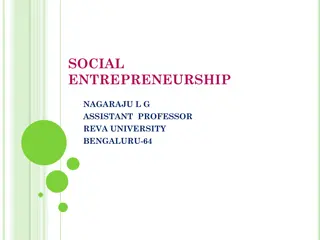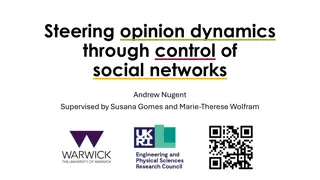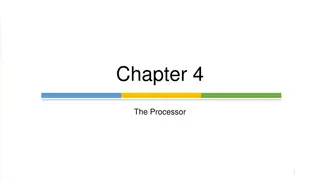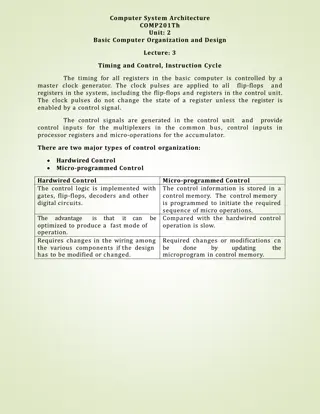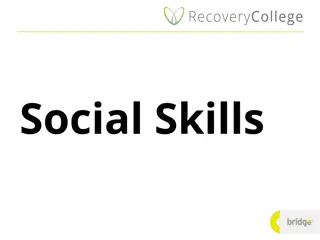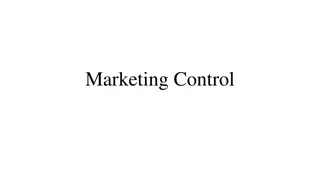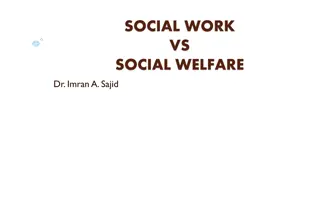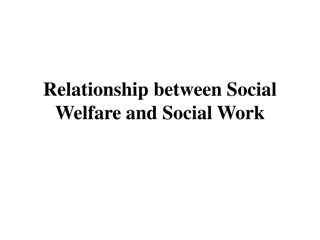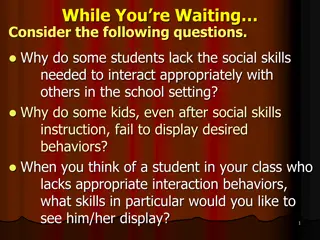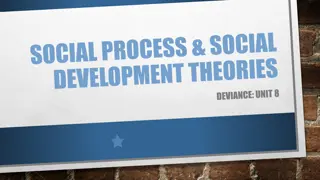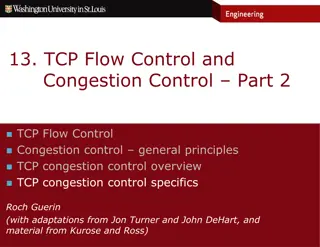Understanding Social Control: Importance and Types
Social control is essential for maintaining order and stability in society. It encompasses various methods such as persuasion, coercion, and restraint to ensure conformity to accepted behavioral standards. Internal and external social control mechanisms play crucial roles in shaping social behavior and promoting predictability. The influence of social control extends to individual and group welfare, emphasizing the significance of maintaining social order for the well-being of all members of a community.
Download Presentation

Please find below an Image/Link to download the presentation.
The content on the website is provided AS IS for your information and personal use only. It may not be sold, licensed, or shared on other websites without obtaining consent from the author. Download presentation by click this link. If you encounter any issues during the download, it is possible that the publisher has removed the file from their server.
E N D
Presentation Transcript
Social control CA 1
Social control Social control is the pattern, suggestions, persuasion, restraint and coercion by whatever means including physical force by which a society brings into conformity to the approved pattern of behavior. Social control is the way in which entire social order coheres and maintains itself. wkqu; iudc yeisrsug wkql=,jSug n,flfrk Wkkaoqlrjk l%shdoduhls 2
Social Control All societies have ways to promote order, stability and predictability in social life. Without social control, social life would be unpredictable, even chaotic. There are two broad types of social control: Internal and External Iudcfha ia:djrNdjhla l%uhla mj;ajd.ekSug iudc md,khla wjYHh wNHk;ar yd ndysr jYfhka iudc md,k l%u folls 3
Social control H.C. Bearly says, "Social control is collective term for those processes, planned and unplanned, by which individuals are taught persuaded or compelled to conform to the usages and life values of group." E.A. Ross defines "Social control as the system of devices whereby society brings its members into conformity with the accepted standards of behavior. Ogbum and Nimkoff are of the opinion that "Social control is the pattern of pressure which society exerts to maintain order and establish rules." 4
Nature of Social Control The main characteristics of social control are: Social control is the control of society over individuals. Mqoa.,hska flfrys md,khla we;s lrhs Social control denotes some kind of influence. This influence may be exercised in various ways by means of public opinion, coercion, religion, leadership etc. The influence of social control is essentially exerted by the society or community 5
Nature of Social Control The influence of social control is exercised for promoting the welfare of all the individuals or the group as a whole.mqoa.,hska yd lKavdhus j, iuia: iqHidOkh jevslsrsu iudc md,kfha wruqKls Social control is as old as human society. It is an essential condition of the human society. The influence of social control is universal. Where there is society, there is social control. Social control is exercised through both formal and informal agencies 6
Need of Social Control Social control is necessary for an orderly social life. . Without social control the organization of the society is about to get disturbed. According to Kimball Young, it is necessary to bring about conformity, solidarity and continuity of a particular group or society . It is possible only through social control. Society has to make use of its mechanism to accomplish the necessary order and discipline. 7
Need of Social Control Herbert Spencer - view that society is a collection of group of individuals. Man lives in society because it has a utility. Through society he is able to preserve his identity and views. In order to preserve his identity and characteristics, he has to exercise some control for which certain rules and institutions are created. These agencies of social control are helpful for preserving the identity of the individuals and society. 8
Mechanisms of Social Control Social control is the control exercised by the society over its members. There are many people in society who always conform to the social norms and values and they are known as conformists. But few people who always deviate from the existing norms and values. They are known as nonconformists or deviants. Social control mechanisms are means by which society can influence people s behavior to conform to expectations. 9
Social Control Theory Travis Hirschi in 1969.Social Bond Theory. Four elements which constitute the societal bond. These bonds include: Attachment -- to other individuals Commitment -- to following rules Involvement -- by typical social behaviors Belief -- a basic value system When one of these four items break down, Hirschi hypothesizes that an individual may then participate in criminal activities 10
Social control theory Describes internal means of social control. It is one of the more widely accepted explanations in the field of criminology in its attempt to account for rates in crime and deviant behavior. Unlike theories that seek to explain why people engage in deviant behavior, social control theories approach deviancy from a different direction. The theory seeks to explain how the normative systems of rules and obligations in a given society serve to maintain a strong sense of social cohesion, order and conformity to widely accepted and established norms. 11
Containment Theory Containment Theory and Social Bond Theory Why aren t we all deviant? Two control theories Containment Theory and Social Bond Theory have been developed to answer this question. 12
Containment Theory Containment Theory -Walter Reckless (1967) suggested that people are drawn toward deviance for various reasons (frustration, media influence, poverty, etc). These negative influences pull all individuals toward deviance in some way. There must, then, be some way of containing individuals within the norms. 13
Containment Theory Suggested that people could be insulated from crime If properly socialized by his parents and peers, the individual will control (or contain ) himself. The individual provides his own containment (controlling those natural impulses that could lead to the violation of norms). If the individual cannot contain himself from violating norms, his family and/or peers may try to contain him. If that fails, the other social institutions of informal social control may provide containment. 14
Techniques of Social Control Analyses of the forms of social control differ. A common distinction is between repressive or coercive forms of control so called hard techniques, including direct physical constraint and the softer ideological forms that operate through the shaping of ideas, values and attitudes. 15
Types or Forms of Social Control The formal means of social control come from institutions. jsOsu;a md,kh ixia:d ;=,ska flfra Man is forced to accept these forms of social control Generally these forms are exercised by secondary groups. The state, law, education and those which have legitimate power. They apply coercive measures in the case of deviance. 16
Internal Social Control Internal social control lies within the individual, and is developed during socialization. You are practicing internal social control when you act according to your conscience (ie. you do something because it is the right thing to do). wNHka;r md,kh idudcdkqfhdackfha m%;sM,hla f,I mqoa.,hd ;=,ska isoqfjs Most people act according to this internal social control (ie. they do the right thing) most of the time. 17
External Social Control The process of socialization does not ensure that all people will conform all of the time. For this reason, external social control must also be present. External social control is based on social sanctions rewards and punishments designed to encourage desired behavior. Positive sanctions (e g . smile o f approval, awards, raises) are used to encourage conformity. Negative sanctions (e g . criticism, fines, imprisonment) are intended to stop socially unacceptable behavior. Sanctions may be formal or informal -Formal (eg. low grades, awards, jail time) Informal (eg. ridicule, gossip, smiles) 18
Types or Forms of Social Control Informal social control These agencies of Social Control have grown according to the needs of the society. Folk ways, mores, customs, social norms etc. fall under this category of social control. Generally primary institutions exercise this type of social control. 19
Agencies of Social Control There are following agencies of social control Law State Education Folkways Mores Administration Religions Family Neighborhood Public Opinion 20
Law Law is an important formal means of Control to regulate the individual behaviour in society 21
states Modern nation-states strive to be welfare states, i.e. they seek to provide to the citizens a wide range of social services like education and medical care.myiqlus iemhSu ;=,ska iudc jsfrdaOs yeisrsu wvqlsrsu In modern societies, State has become increasingly important as an agent of social control. 22
Education It is education, which makes all efforts to discipline the mind of the student in the school so that he can realize the importance of social control.mqoa., uki oshqKqlsrsu yd jskhla we;sldrsu ;=,ska iudc md,khl jgskdlu wjfndaO lrjSu 23
Folkways Folkways are norms to which individuals conform. It is customary to do so. Conformity to folkways is not enforced by law or any other agency of the society mqoa.,hka wkq.;jsh hq;= iudc ium%odhka Folkways are manifested in matters of dress, food habits, observance of rituals, forms of worship and methods of greeting etc. 24
Mores Mores represent another category of norms. Mores are considered to be essential for group welfare Mores seek to regulate the relationship between individuals in defined situations, The positive mores prescribe behavior patterns while the negative mores or taboos prescribe or prohibit behavior patterns. 25
Religion Religion serves as an important agency of social control. It is religion, which supports the folkways and modes of a society by playing super natural sanctions behind them. It adopts negative as well as positive means to regulate the behavior of the individuals in society. 26
Administration Administration - Administration is very powerful and the most effective instrument of social control. It forces the individual to obey social control. The administrations punish the violators with the help of the police, the army etc 27
Family Family is a very important instrument agency of social control. Family prescribes rules and regulations that the members have to follow. These rules and regulations form a part of social control. The family socializes the child into the norms, values, traditions and customs of the group. Thus, family has predominant role in the shaping of the personality of the child. Family teaches the child to conform to the norms of the society. It exercises control over its members to bring about the desired action. 28
Neighborhood Neighborhood is a simple and specific part of a community. It has a feeling or sentiment of local unit. There may be more than one Neighbourhood in a community. The neighbourhood is the first community with which the individual comes into contact with. It exists, a deep influence on its members as an agency of social control. 29
Public Opinion Public Opinion of the people is the most important method of social control in a democratic set up. Every man tries to escape from the criticism and condemnation by the society. He therefore, tries to act according to public opinion and public sentiments. In a democratic set up, public opinion is more effective and important than any other agency. Newspapers, radio, television, motion pictures, legislations, pamphlets, etc. frame public opinion. 30
Social control The techniques and strategies for regulating human behavior in a society. Dimension of social control: Conformity: as going along with one s peers- individuals of a person s own status who have no special right to direct that person s behavior. Obedience: as compliance with higher authorities in a hierarchical structure. 31







